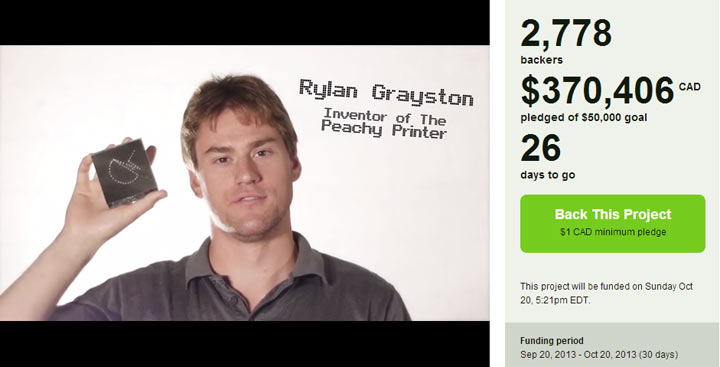REGINA – Three years ago, a Kickstarter crowdfunding campaign began with the goal of building a $100 3D printer, but instead it ended with one partner allegedly using over $300,000 to build a house.

Rylan Grayston, founder of Peachy Printers, alleges his former business partner, David Boe, used about half of the $650,000 they raised through a Kickstarter campaign on a house instead of the printer.
The Saskatoon Police Service (SPS) launched an investigation into this matter in November 2015. Now another body is investigation the situation.
READ MORE: Former 3D printer co-owner allegedly embezzles crowdfunding money to build Sask. house
The Financial and Consumer Affairs Authority (FCAA) has received several calls over the past few days and launched their own investigation.
It is still in the very early information gathering phase, and the FCAA would like anyone who contributed money to the Peachy Printer Kickstarter campaign to contact them directly.
At this point, FCAA doesn’t know if legal action is a possibility because they need to answer an important question first.

Get breaking National news
“Are they legally obligated to deliver; well yes, if it’s for the presale of a good,” FCAA Communications Consultant Matt Barton explained.
“But if they’re giving money to Kickstarter and it’s just for research and development, or an abstract concept that hasn’t yet hit the market it’s very much a buyer beware situation.”
- US forces stop 2nd oil tanker off Venezuela coast as Trump follows promise to seize tankers
- Flu hospitalizations rise sharply as H3N2 spreads across Canada
- Tax season is still months away. Doing 3 things now could help you later
- Paraplegic engineer becomes the first wheelchair user to blast into space
In the Peachy Printer campaign, they offered people perks like device kits that need assembly for $100 and pre-made printers for larger contributions.
However, on the webpage, it is made explicitly clear the final design of the project wasn’t finished during the fundraising campaign, and more development was required.
David Gerhard, an associate professor of computer science at the University of Regina, echoes Barton’s “buyer beware” warning for crowd funding.
“So it does feel a lot like you’re buying a product, but you’re not – you’re funding the development of a product. And if you’re lucky and they do what they say they’re going to do you get the product,” Gerhard said.
He says the financial contributions are essentially a gift, with the hope of getting a reward down the line.
“This is the really interesting thing about the way the Kickstarter terms of service have been written out. As long as the people who are running it are doing their genuine best to get the project out then you really have no recourse,” he explained.
However, if criminal charges against are filed against Boe, Tony Merchant of Merchant Law Group says a judge would likely ignore those terms of service and see fraud as fraud.
Merchant says it there would be difficulty in recovering any of the allegedly embezzled money though since it has been spent, but he said it could potentially be recouped through the sale of the house Boe supposedly built with the money.






Comments